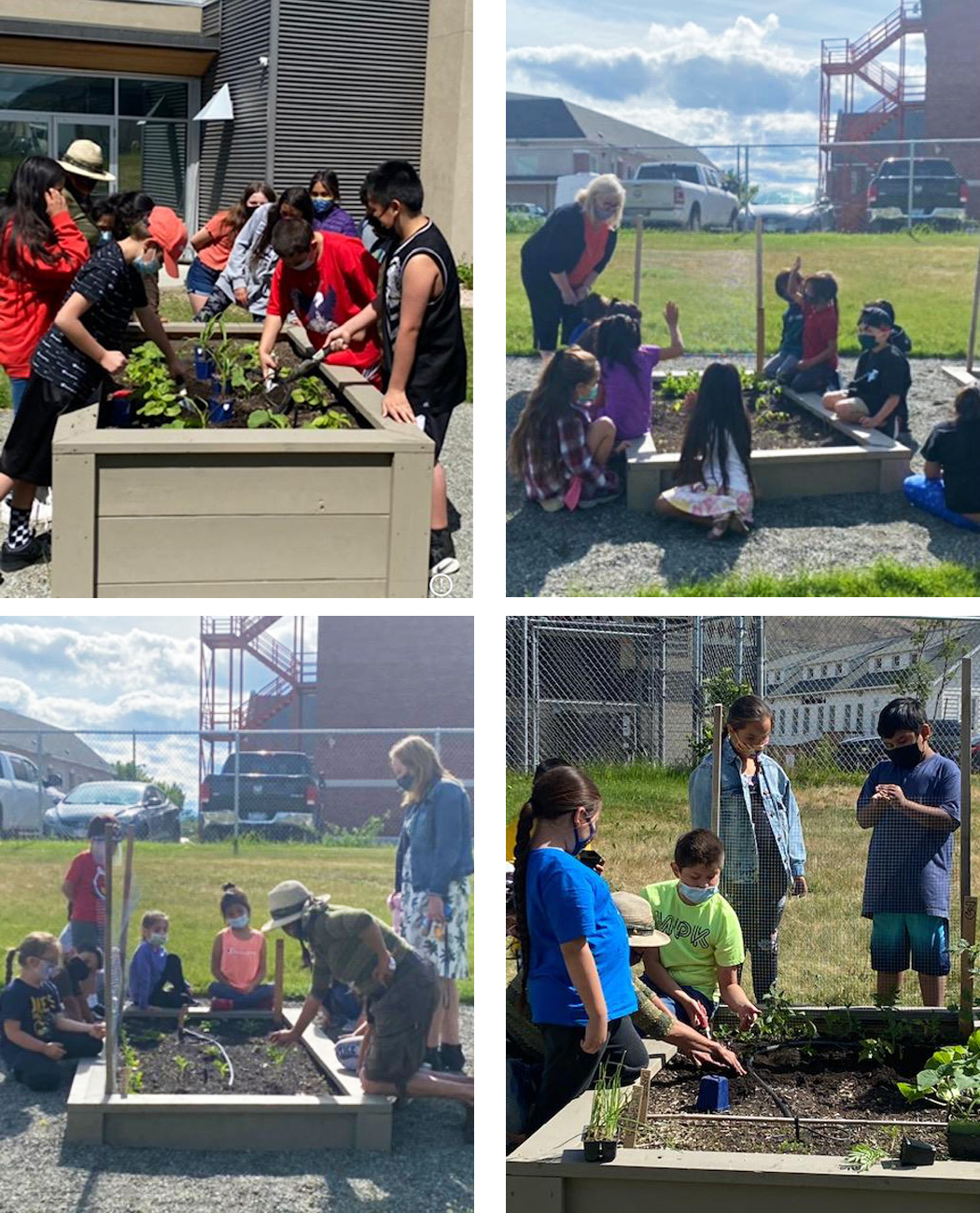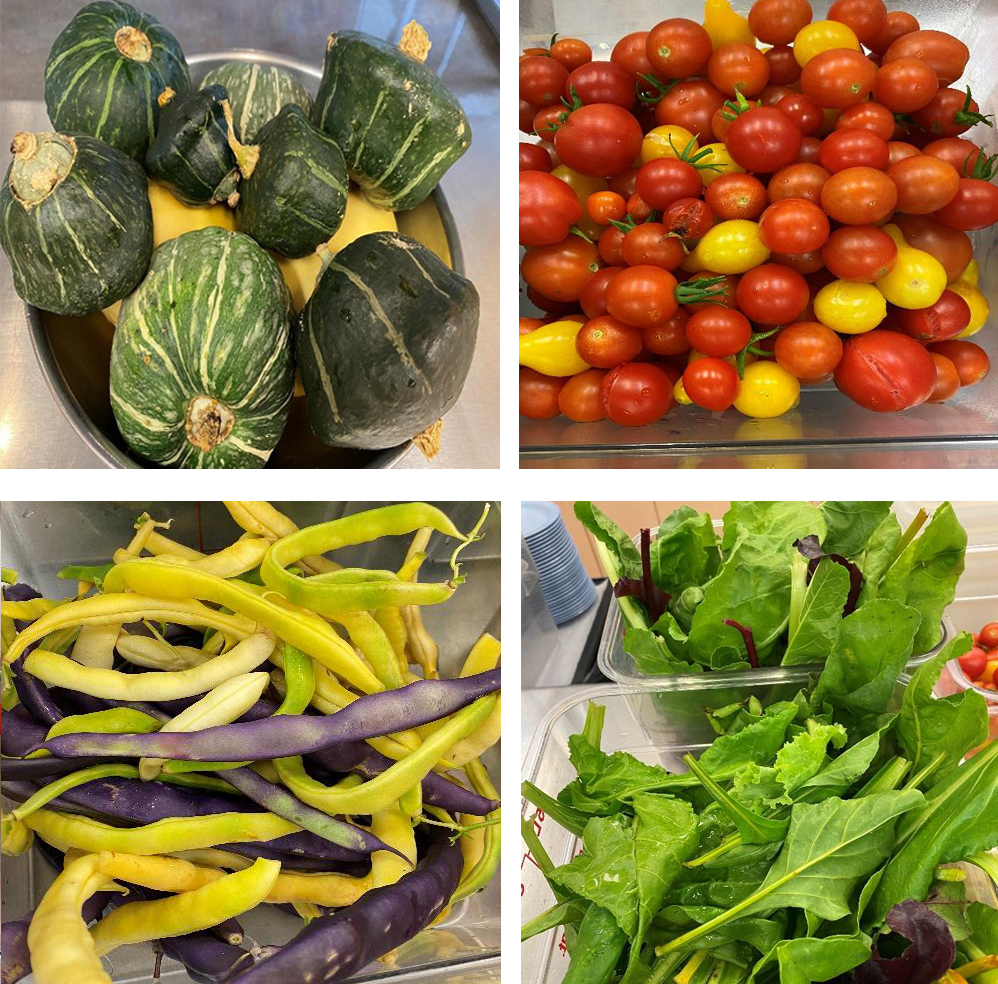
Sk’elep School of Excellence, Kamloops, BC
Grant term 2020-2022
Over the past few years, Sk’elep School of Excellence has partnered with Q’wemtsin Health Society, Farm to Cafeteria Canada, and the Tk’emlups te Secwepemc Indian Band to develop a food sovereignty plan. With this financial support, the first phase, the school gardens, was completed with 10 raised garden beds, a garden shed with a planting table, and a large live-edge table for outdoor classroom use. The students and staff were super excited with this new project and with the help of the garden team, have planted and harvested vegetables for our daily school lunch program. We are hoping to be able to use our new salad bar for school lunches and community lunches/dinners as soon as all COVID restrictions are lifted.
Indigenous food systems are foundational to human and environmental health and support First People’s perspective on health and wellness. Our school gardens have students take pride in growing food from seeds to harvest, allow us to use the harvest in our lunch program and emphasize healthy eating habits among our students. This project aims to connect youth with their food by teaching them how to grow, harvest, cook and enjoy real food. Through increased knowledge of their own food growth, we are empowering children to become active participants in their food choices. This allows children to make better food choices and understand the positive impact of staying healthy and keeping active. By becoming informed eaters, the students will help make a positive impact on the larger world of food and farming well into the future. The school gardens offer hands-on experiential learning that connects children to nature, their food, and one another. Our project will allow students to get their hands dirty while learning firsthand how to plant, how things grow, taking care of their plants, harvesting and allowing our students to be a part of this food sovereignty movement while learning about nutrition and eating healthy. The gardens allow educators the chance to link lessons to real life, in a context that children can understand. Our elders have been involved and speak about the full circle of this project and the healing that it has and will have moving forward. Our garden project team will also be developing additional curriculum to provide teachers lessons to support gardening, growing, and harvesting for the students. The gardening projects will enhance the curriculum and connect with many Science, Math, Health Education, and Cultural outcomes. We were fortunate to be involved in Qwemtsin Health Society’s Indigenous Food Sovereignty Video Series.
 To reach our goals of encouraging healthy eating, adopting a healthy lifestyle and caring for student’s emotional and mental health, we are hoping to continue with our food sovereignty plans and continue to utilize our outdoor learning space for planting, growing, harvesting and cross curricular education.
To reach our goals of encouraging healthy eating, adopting a healthy lifestyle and caring for student’s emotional and mental health, we are hoping to continue with our food sovereignty plans and continue to utilize our outdoor learning space for planting, growing, harvesting and cross curricular education.
Our school gardens bring:
- a source of food for improving children’s diet and nutrition
- a source of healthy influences — physical activity, ingredients for school meals
- an area of learning — about nature, agriculture, nutrition, math, science, Secwepemc culture and other subjects
- a place of pleasure and recreation — flowers and shrubs, play areas, shade, eating areas
- a continuing lesson in respecting the environment and taking pride in one’s school
- a gathering spot for students, staff, elders, community members
- learning from the land
- learning traditional Secwepemc uses of various plants and medicines
- learning traditional Secwepemc names for traditional plants and medicines
- a place of healing
This Spring, teachers and students have started to plant seeds to be later transferred to our garden beds. Students will be involved right from the beginning by cleaning out the beds, learning about the garden tools and how to plant, planting seeds, watching seedling sprout, transferring to outdoor garden, weeding and maintaining the gardens to harvest. We have our own horticulturist that works with the students and staff to plant and maintain our gardens. The outdoor area will continue to be used as an educational classroom to allow students to get their hands dirty and learn where food comes from, how it grows, and the different ways to harvest. A plan to grow sweetgrass in one of the garden beds to use as cultural teachings and give aways was a wonderful idea from our school elders. Last year, the students grew “the three sisters” corn, squash and beans which were growing techniques that complement each other. The students enjoyed learning and planting throughout the process. The students and staff are excited to begin another season of growing and hope it continues to be as successful as it has been.
One huge positive outcome of Sk’elep School’s gardens is that last summer our gardens were used to supply fresh vegetables to the evacuees from the local fires. This had an enormous positive impact on the community.
Attached is the newspaper article:
Sk’elep Food Sovereignty Program Feeds Evacuees
Posted on: July 7, 2021
Q’wemtsín Health Society (QHS) and Sk’elep School of Excellence have been working in partnership on a food sovereignty program and are thrilled to be able to use products from that project to help feed evacuees from local forest fires.
“The need for food sovereignty became more evident during the COVID pandemic and now again during these times of emergency,” explained Kukpi7 Rosanne Casimir, “Tḱemlúps te Secwépemc Council and community are incredibly proud of the students for being able to help out in this way”.
The food security project started through the dedication of Laura Kalina, a dietitian with the Q’wemtsín Health Society, who is committed to being able to produce healthy food locally. “QHS sees land-based programs such as the food security project, as part of the overall strategy to build healthy and resilient communities”.
The idea was brought to the Sk’elep School principal Cheryl Sebastian and Lead Teacher Arlene Dixon, who were immediately committed to the goal of teaching the students about the importance of locally grown food. “Sk’elep students have really enjoyed the experience of planting, tending, and harvesting the crops. Culturally, food is the centre of our family and community relationships, so it is extra special that the harvest from our gardens is feeding our neighbours and friends in a time of stress and need”.
Kukwstép-kucw to all the Sk’elep students and staff and QHS for being able to help so many!
Some examples of the student’s harvest from the school gardens:





